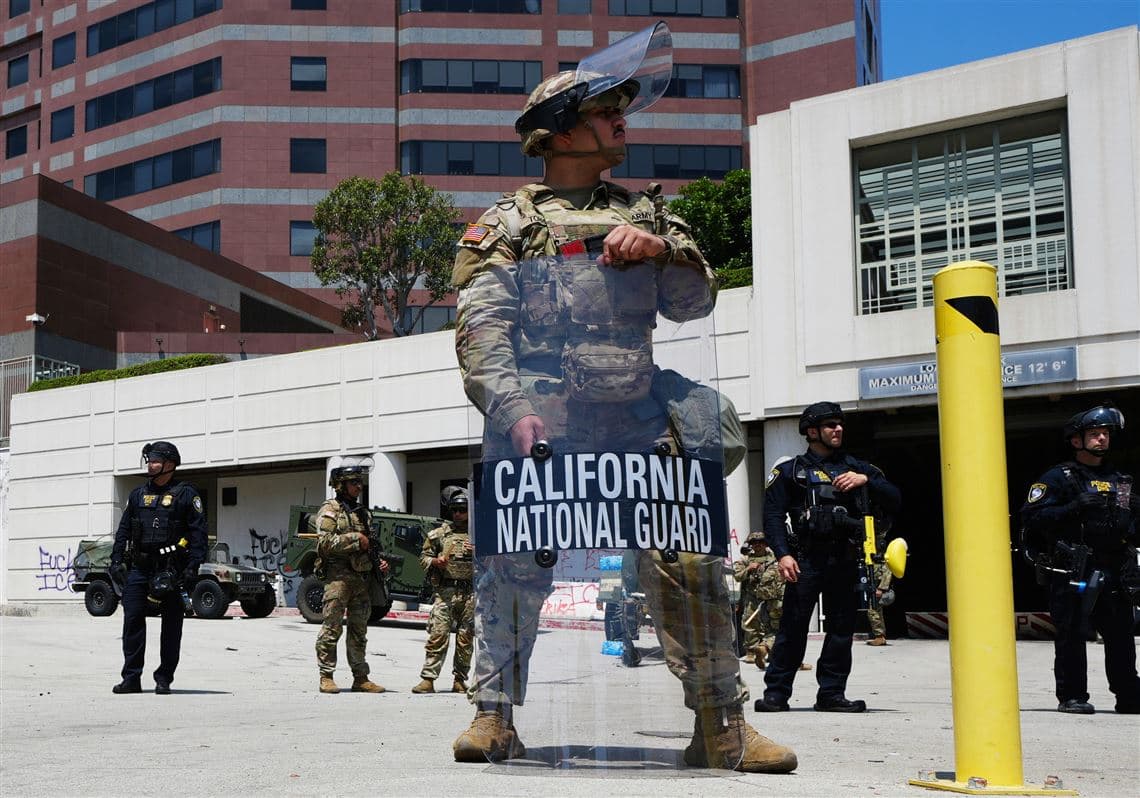A massive immigration enforcement operation has erupted in Los Angeles, with 90 armed troops deployed to enforce federal immigration laws under the Trump administration"s directive. The military presence, which includes 17 Humvees and four military cargo trucks, raises significant concerns about the militarization of immigration enforcement and its impact on vulnerable communities.
Military Presence in Urban Areas
The involvement of U.S. troops in civilian immigration matters marks a troubling precedent. According to AP News, the Defense Department has stated that these troops are there to protect federal law enforcement from potential threats. However, the deployment of military personnel in predominantly immigrant neighborhoods is likely to escalate tensions and create an atmosphere of fear among residents.
Escalating Fear and Distrust
Local leaders, including California Congresswoman Nanette Barragán, have condemned the operation, arguing that it serves to instill fear rather than ensure safety. As reported by NPR, Barragán stated that the move is an “escalation of fear” designed to intimidate immigrant communities. This sentiment echoes across many neighborhoods in Los Angeles where immigrant families are already facing heightened anxiety about their status and safety.
\n\n
US court lets Trump keep control of California National Guard ...
Legal Implications of Military Involvement
The use of National Guard troops in immigration enforcement raises complex legal questions, particularly regarding civil rights and due process. Under Title 10, military forces can be deployed to protect federal personnel, but critics argue that this blurs the line between military and civilian law enforcement. The NPR outlines ongoing legal challenges to these military operations, which could set precedents affecting the rights of immigrants across the country.
Impact on Community Relations
The increased military presence is likely to deepen the divide between immigrant communities and law enforcement. Historically, fear of immigration raids has led to underreporting of crimes and reluctance to cooperate with local police, undermining public safety efforts. As reported by AP News, many residents fear that engaging with law enforcement could lead to deportation, further isolating them from essential community services.
\n\n
Trump orders ICE to hit Democrat-run cities with deportation ...
The Broader Context of Immigration Policy
This operation is part of a broader trend of aggressive immigration enforcement under the Trump administration, which has included deploying thousands of troops to California to support Immigration and Customs Enforcement (ICE). The push to militarize immigration enforcement is a stark reminder of the current administration"s priorities, which prioritize punitive measures over compassion and support for vulnerable populations. The NPR highlights how these policies have resulted in increased raids and detentions, often under the guise of national security.
The people affected by these policies are not just statistics; they are families, individuals seeking safety, and communities that contribute to the fabric of American society. As military operations continue, we must advocate for humane immigration reform that respects human rights and provides a pathway to safety for those fleeing violence and persecution.

![[Video] Federal officers deploy sting balls and flash grenades at Whipple Building](/_next/image?url=%2Fapi%2Fimage%2Fthumbnails%2Fthumbnail-1768340555229-vhfcc-thumbnail.jpg&w=3840&q=75)
![[Video] Crowd-control weapons used in Minneapolis as anti-ICE protesters attack police vehicle](/_next/image?url=%2Fapi%2Fimage%2Fthumbnails%2Fthumbnail-1768336302231-akxf7s-thumbnail.jpg&w=3840&q=75)

![[Video] Protests erupt in Minneapolis after ICE detains teenager, multiple arrests made](/_next/image?url=%2Fapi%2Fimage%2Fthumbnails%2Fthumbnail-1768331835371-z9ylqg-thumbnail.jpg&w=3840&q=75)


![[Video] Gunfire between Iraqi security forces and Sadr militias in Baghdad](/_next/image?url=%2Fapi%2Fimage%2Fthumbnails%2Fthumbnail-1768343508874-4redb-thumbnail.jpg&w=3840&q=75)
